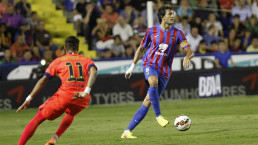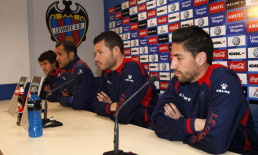They say that you would have to feel it first-hand on a solitary occasion to understand its meaning and significance, but in reality there have been so many times that this knowledge and perception is not entirely unknown… Héctor Rodas stepped onto the Vallecas pitch in January 2014 anointed with the status of captain of the azulgrana team. The armband with the granota crest was proudly displayed on his arm. The absence of Pallardó from the starting line-up chosen by Joaquín Caparrós and the stay of Juanfran and Navarro in Valencia, with the rest of the players not called up, led him to defend that position after taking his place on the pitch ready to take on the battle. It is not a novel condition in itself to wear the label that accredits him as the maximum reference on the green. However, it would be necessary to clarify this statement in order to find the full significance of its meaning.
Héctor Rodas made his debut against Rayo Vallecano as captain in official competition as a member of the first team squad. There would be more matches with that badge, such as a match against FC Barcelona. For a footballer who cut his teeth in the Barça youth academy, it is possible that it is a dream come true; a dreamlike vision that, on occasion, he has recreated. However, the trend varies if you scrutinise the defender’s CV during his time at the Levante U.D. The verdict changes in that sense. And it could be said that Héctor Rodas became captain of captains in the thick of the Madrid night at the Vallecas Coliseum. This is not a gratuitous and unfounded statement, if you analyse his movements in that steep journey through the different levels of the lower categories developed by the footballer from Los Poblados Marítimos. In a way, Héctor traced the perfect sphericity of a circle on the green of Vallecas.
It does not seem to be within the reach of all players to hold such a badge in practically all the squads to which one has belonged with the particularity that comes from always defending the same crest after a long pilgrimage, in perfect communion with patience and perseverance, through all the different levels of grassroots football of the Blue and Whites’ institution, solving arcana and mysteries. This fact gives notoriety to the case exemplified by Héctor Rodas. There was a time when Rhodes had worn only the blue and red shirt with the embroidered shield of the bat. At the end of the 2014-2015 season, he decided to close his time as a Granota for good. Being part of the captains’ group was a challenge and perhaps also a reward for the work done, but it is not unheard of from a more intimate perspective.
From the dawn of his career as a Granota player, he was accustomed to wearing the armband and assuming the responsibilities inherent to the position from his earliest youth. From his time as a youngster until he reached the world of the first team, passing through the infantile, cadet, youth and reserve teams. The defender’s arrival in the select group of captains was a product of Iborra’s departure to Sevilla. In reality, it seemed more like a transfer of power between equals; between two players who have always felt much more than just team-mates with shared experiences in the depths of the Granota dressing room. This complicity was much more evident off the pitch. The midfielder’s departure to Seville led to changes in the Levante captaincy for the 2013-2014 season. Héctor Rodas took over the captaincy. It did not seem a drastic change. The Valencian gene, one of the aspects that made that collective unique and gave it its identity, remained intact. As well as loyalty, respect and love for the colours.

